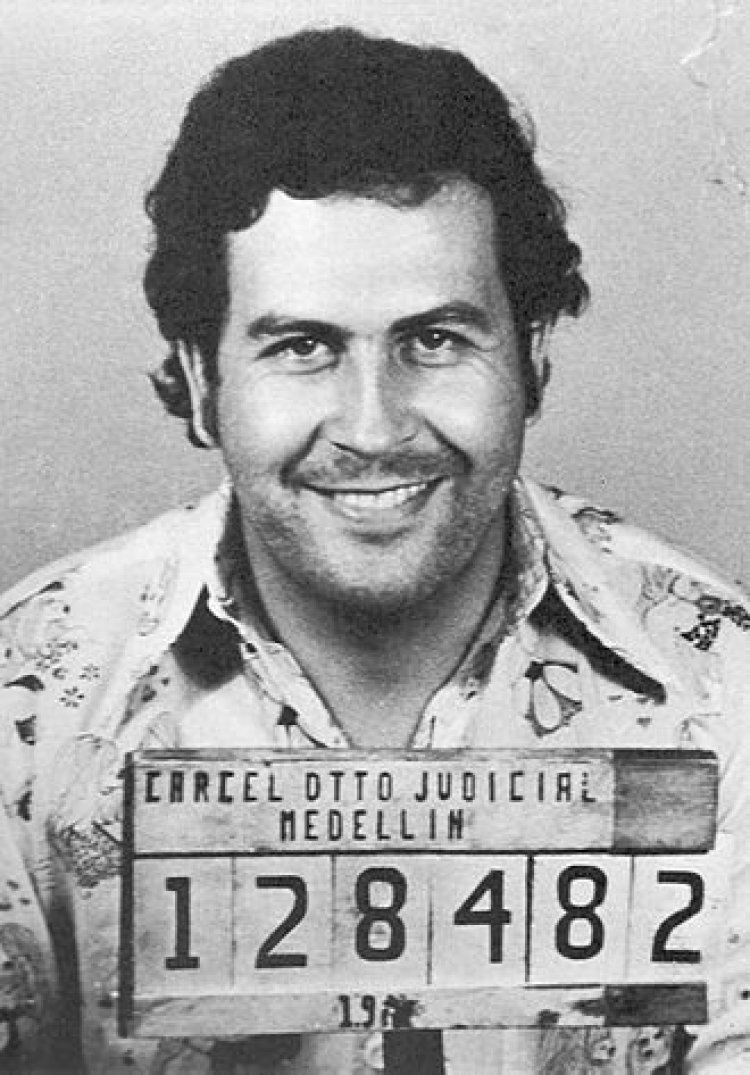A short Note on Pablo Escobar the founder of the Medellín Cartel
In 1976, Escobar founded the Medellín Cartel, which distributed powder cocaine, and established the first smuggling routes into the United States.... Born in Rionegro and raised in Medellín, Escobar studied briefly at Universidad Autónoma Latinoamericana of Medellín, but left without graduating; he instead began engaging in criminal activity, selling illegal cigarettes and fake lottery tickets, as well as participating in motor vehicle theft. In the early 1970s, he began to work for various drug smugglers, often kidnapping and holding people for ransom.

Pablo Emilio Escobar Gaviria (/ˈɛskəbɑːr/; 1 December 1949 – 2 December 1993) was a Colombian drug lord and narcoterrorist who was the founder and sole leader of the Medellín Cartel. Dubbed "The King of Cocaine," Escobar is the wealthiest criminal in history, having amassed an estimated net worth of US$30 billion by the time of his death—equivalent to $64 billion as of 2021—while his drug cartel monopolized the cocaine trade into the United States in the 1980s and early 1990s.
In 1976, Escobar founded the Medellín Cartel, which distributed powder cocaine, and established the first smuggling routes into the United States.
Born in Rionegro and raised in Medellín, Escobar studied briefly at Universidad Autónoma Latinoamericana of Medellín, but left without graduating; he instead began engaging in criminal activity, selling illegal cigarettes and fake lottery tickets, as well as participating in motor vehicle theft. In the early 1970s, he began to work for various drug smugglers, often kidnapping and holding people for ransom.
Escobar's infiltration into the U.S. created an exponential demand for cocaine and by the 1980s it was estimated Escobar led monthly shipments of 70 to 80 tons of cocaine into the country from Colombia.
As a result, he quickly became one of the richest people in the world, but constantly battled rival cartels domestically and abroad, leading to massacres and the murders of police officers, judges, locals, and prominent politicians, making Colombia the murder capital of the world.
In the 1982 Colombian parliamentary election, Escobar was elected as an alternate member of the Chamber of Representatives as part of the Liberal Alternative movement.
Through this, he was responsible for community projects such as the construction of houses and football fields, which gained him popularity among the locals of the towns that he frequented.
However, Escobar's political ambitions were thwarted by the Colombian and U.S. governments, who routinely pushed for his arrest, with Escobar widely believed to have orchestrated the DAS Building and Avianca Flight 203 bombings in retaliation.
In 1991, Escobar surrendered to authorities, and was sentenced to five years imprisonment on a host of charges, but struck a deal of no extradition with Colombian President Cesar Gaviria, with the ability to be housed in his own, self-built prison, La Catedral. In 1992, Escobar escaped and went into hiding when authorities attempted to move him to a more standard holding facility, leading to a nationwide manhunt.
As a result, the Medellín Cartel crumbled, and in 1993, Escobar was killed in his hometown by Colombian National Police, a day after his 44th birthday. Escobar's legacy remains controversial; while many denounce the heinous nature of his crimes, he was seen as a "Robin Hood-like" figure for many in Colombia, as he provided many amenities to the poor. His killing was mourned and his funeral was attended by over 25,000 people.
Additionally, his private estate, Hacienda Nápoles, has been transformed into a theme park. His life has also served as inspiration for or has been dramatized widely in film, television, and in music.
Note: please Comment Here for UPDATES and CORRECTIONS
Donate. Buy Us Coffee
Why news media is in crisis & How you can fix it.
India needs free, fair, non-hyphenated and questioning journalism even more as it faces multiple crises. But the news media is in a crisis of its own. There have been brutal layoffs and pay cuts. The best of journalism is shrinking, yielding to the crude prime-time spectacle. My digital news .in has very few young reporters, columnists and editors working for it. Sustaining journalism of this quality needs smart and thinking people like you to pay for it. Whether you live in India or overseas, you can do it here
Donate. https://mydigitalnews.in/donate
NOTE: Please email us for updates and corrections, if you wish to publish articles like this you can send them to info@mydigitalnews.in or mydigitalnews.in@gmail.com or you can Directicle write Articles on our Site by registering https://mydigitalnews.in/register
Disclaimer: Mydigitalnews.in provides the content from various information sources ‘as is and the content to be used only for informational purposes and not responsible for the inaccuracy or deficiency of the provided information. Mydigitalnews. in have the right, at its sole discretion, to make modifications in any aspect of the provided information.
Mydigitalnews. in Internet site may contain links to other Internet sites. While we try to link only to sites that share our high standards and respect for privacy, we are not responsible for the content or the privacy practices employed by other sites. .
What's Your Reaction?










































































